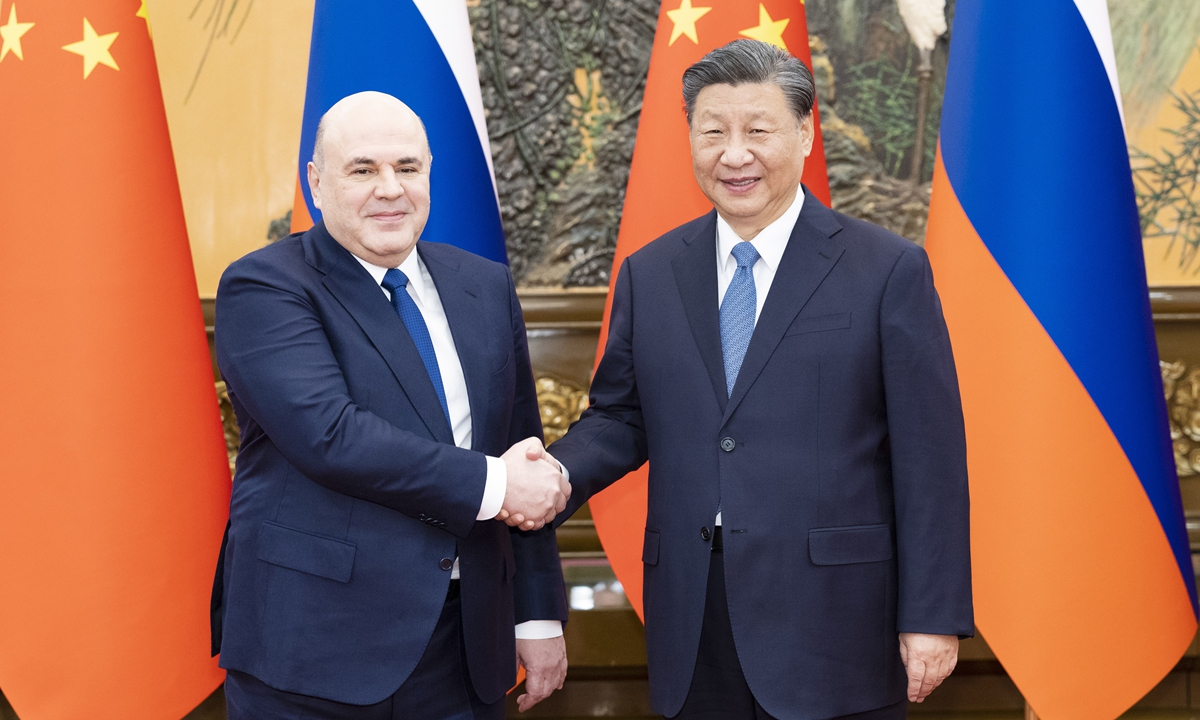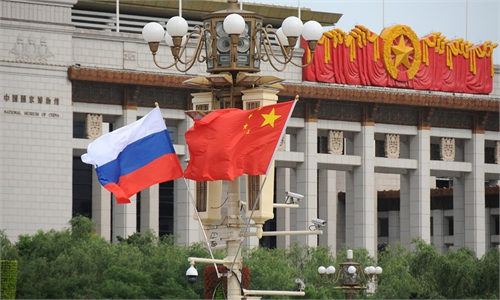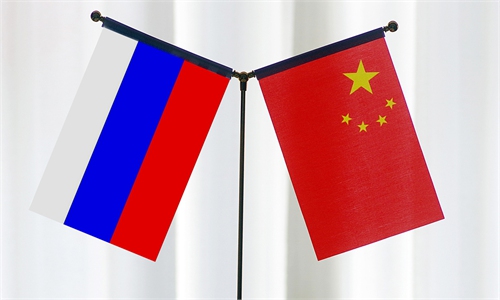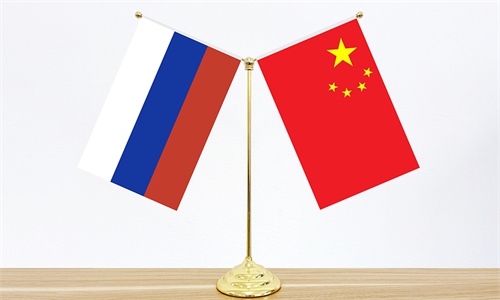China, Russia hail bilateral ties as strategic choice, stabilizer of intl relations amid Russian PM’s China visit

Chinese President Xi Jinping meets with Prime Minister of the Russian Federation Mikhail Mishustin in Beijing, on December 20, 2023. Photo: Xinhua
Maintaining and developing China-Russia relations is a strategic choice made by both sides based on the fundamental interests of the two peoples, Chinese President Xi Jinping said in his meeting with Russian Prime Minister Mikhail Mishustin on Wednesday, following the Russian high-ranking official's meeting with Chinese Premier Li Qiang, chairing the 28th regular meeting between the Chinese and Russian heads of government.Chinese experts hailed the close strategic collaboration between the two countries in recent years as a model of a new type of great power relations, which is crucial to the stable development of the international community. In addition, under the leadership of the heads of state, the internal driving force of ties is expected to be strengthened, not only in trade and the economy, but also cultural and people-to-people exchanges.
In his meeting with Mishustin, Xi said the governments, legislative bodies, political parties and localities of the two countries have carried out in-depth exchanges, and pragmatic cooperation in various fields has developed in a sound and steady manner.
In the first 11 months of this year, bilateral trade between China and Russia achieved the annual trade volume target of $200 billion jointly set by the two heads of state, which shows the strong resilience and broad prospects for mutually beneficial cooperation between the two countries, Xi said.
Xi also expressed the hope of taking the 75th anniversary of the establishment of diplomatic relations between China and Russia next year as a new starting point to continuously expand the positive effects of high-level political relations and jointly move forward in the process of comprehensively promoting economic and social development and realizing national rejuvenation.
Mishustin hailed the China-Russia relationship as being "at the highest level in history," adding that it is maintaining a rapid momentum of development. He described bilateral ties as "a ballast and stabilizer of international relations," according to Xinhua.
Russia is willing to work with China to strengthen communication and coordination within multilateral mechanisms such as the UN and BRICS, Mishustin said, Xinhua reported.
Li Haidong, a professor at the China Foreign Affairs University, told the Global Times that Xi's meeting with Mishustin highlights the mutual trust and support at the strategic level between Beijing and Moscow.
The strengthening of trade and economic cooperation will lay the foundation for cooperation between Beijing and Moscow in broader areas, and the past has shown that strategic coordination between the two sides is very close and productive, Li said.
Unlike the US' approach of "saying one thing but doing another" in dealing with relationships with China, Europe and Russia, China and Russia have always put words into action, said Li, and "that shows why China-Russia relations are a role model of great power relations."
Enhancing driving force
After the meeting on Tuesday, the two heads of government jointly witnessed the signing of cooperation documents in the areas of customs, inspection and quarantine, market supervision, and other fields.
According to Xinhua, the two sides agreed on Tuesday that they should "further enhance the internal driving force" to develop China-Russia relations, expand bilateral trade and agricultural cooperation, create a better business environment for each other's enterprises to invest in their own countries, jointly safeguard the energy security of the two countries, and ensure the security and stability of industrial and supply chains.
Russia is willing to work with China to implement the important consensus reached by the two heads of state, strengthen cooperation in the fields of economy, trade, energy and investment, Mishustin said.
The core result of the high-level contacts is the clarification of the general direction of further enhancing the "internal driving force" and the planning of future practical cooperation, said Cui Heng, a scholar from the Shanghai-based China National Institute for SCO International Exchange and Judicial Cooperation.
Some analysts may think that the development of China-Russian relations is the result of the need to jointly respond to the pressure of the US-led West, but the fact is that they ignore the complementary nature of the economies of the two countries, Cui said.
On the basis of consolidating traditional energy cooperation, Russia and China will pursue high-quality and diversified cooperation, Wan Qingsong, an expert at the Center for Russian Studies at East China Normal University, told the Global Times on Wednesday.
For example, this may include the alignment of industrial chains, complementary trade structures, digitalization, financial cooperation, cooperation in cutting-edge technologies, and security in terms of energy, information and cyber, he added.
China-Russia economic and trade cooperation made a historic breakthrough in 2023. Trade between China and Russia grew steadily in the first 11 months of 2023, hitting $218 billion, up 26.7 percent year-on-year, and exceeding $200 billion for the first time, according to the latest Chinese customs data. Besides, more than 90 percent of the transactions were made in the two countries' respective national currencies: the ruble and the yuan, according to Russian news agency TASS.
Given the sound growth momentum of China-Russia economic and trade cooperation, bilateral trade is expected to reach around $230 billion for the whole year of 2023, Li Xin, director of the Center for Russian and Central Asia Studies at the Shanghai Institutes for International Studies, told the Global Times.
The leaders of the two countries are expected to announce a new bilateral trade target next year, with the two countries' trade volume expected to reach $300 billion over the next couple of years, Li Xin said, noting there is great potential to deepen cooperation in sectors including energy, agricultural products, e-commerce and technologies.
People-to people friendship
In Wednesday's meeting with Mishustin, President Xi called on the two countries to carry out more cultural exchange activities during the 2024-2025 China-Russia years of culture, so as to strengthen the social and public foundation of friendship between the two countries for generations.
Mishustin agreed with Xi's remarks, and expressed condolences to the Chinese side on the casualties caused by the earthquake that jolted Jishishan county in Northwest China's Gansu Province, on behalf of the Russian government and people, saying that Russia is ready to provide rescue help according to the needs of the Chinese side.
On Tuesday, Premier Li Qiang told Mishustin that China is ready to work with Russia to take the opportunity of the 75th anniversary of the establishment of diplomatic ties next year, continue to carry forward China-Russia friendship from generation to generation, and push for new and greater development of China-Russia relations.
Li and Mishustin jointly announced the successful conclusion of the 2022-2023 years of sports exchanges, and the two sides will run the 2024-2025 China-Russia years of culture well. They agreed to strengthen connectivity, enhance personnel exchanges and local cooperation.
Cultural exchanges and cooperation is a "fundamental project" for strengthening bilateral ties, as it always means strengthening mutual trust between the official and non-governmental sectors, and will significantly enhance the risk-resistant capacity of China-Russian relations, Cui Heng said.
With closer political and economic ties between Russia and China, people-to-people exchanges between the two nations will be naturally deepened, Cui remarked.
And there is something more than consolidating the friendly ties, for instance, responding to rising challenges.
In March 2023, President Xi proposed the Global Civilization Initiative, calling for respect for the diversity of civilizations. Also in March, President Vladimir Putin has accused the West of trying to "cancel Russian culture."
Russia, faced with Western sanctions and blocking of culture, needs to find a breakthrough point through cooperation with the Global South and expand the space for cultural cooperation, Wan said.
Cultural exchanges and mutual understanding between China and Russia are based on the promotion of a multipolar and diversified world, as well as a response to the rhetoric of Western politicians about the "democracy-authoritarianism" dichotomy and the infiltration and discrediting of Chinese and Russian cultures in the context of geopolitical tensions, Wan noted.
China and Russia are sending a signal that political manipulation cannot block exchanges between civilizations and cultures, said Wan, "The idea that cultures should be diverse is a concept shared by China and Russia."




